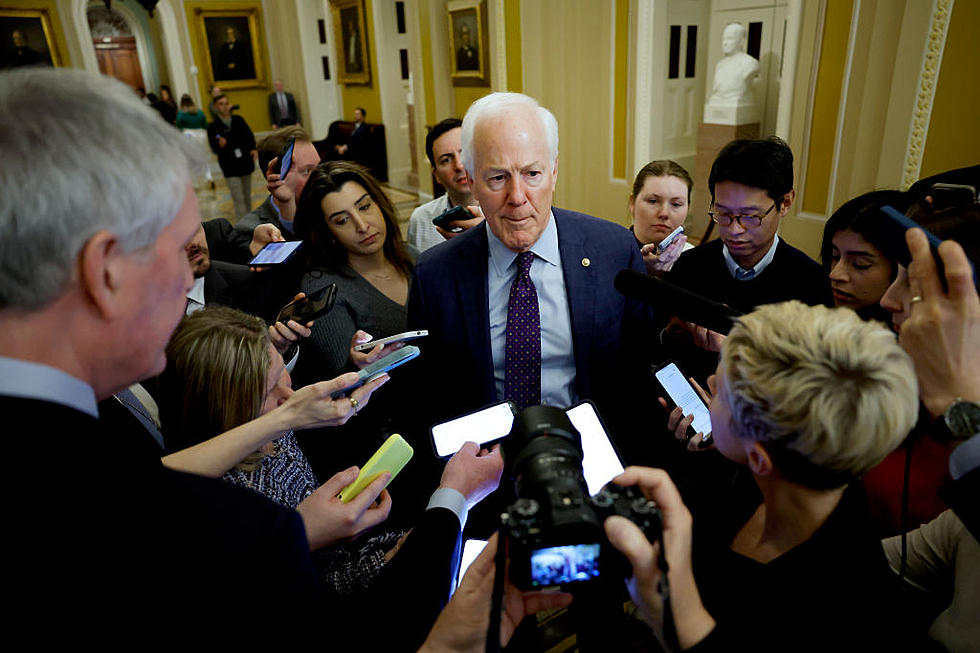Chad’s Morning Brief: Hundreds of Bills Filed in Texas Legislature, Some Anti-Gun Senators Feeling Pressure, & More
Here is your Morning Brief for the morning of March 11, 2013. Give Chad your feedback below and tune in to The Chad Hasty Show for these and many more topics from 8:30 to 11am.
1. 83rd Texas Legislature (link)
Last week we saw the deadline to file bills in the Texas Legislature. According to the Austin American-Statesman, hundreds of bills were filed. School choice, infrastructure, and justice reform were just some of the issues dealt with.
Many lawmakers posted “No more bills” signs on their office doors, and at one point aides backed up outside the Senate clerk’s office waiting to file new legislation that their bosses will inevitably tout as crucial to the very survival of Texas.
Friday at 6 p.m. was the deadline for filing bills in this legislative session, the every-other-year meeting of Lone Star lawmakers that, so far, been more of a budget and basic-issues work fest than a knock-down political brawl like sessions past.
There were few surprises in the last-minute flurry of bills, though Rep. John Zerwas, R-Simonton, filed a last-minute measure giving Health and Human Services Commissioner Kyle Janek authority to negotiate with the federal government over ways to insure more low-income Texans.
Tallies in the Senate and House underscored what had been expected: Roughly the same number of bills were filed as in the last session, with the budget, education, infrastructure, health care and guns as the highest-profile issues.
“I think the priorities have been pretty clear, even since before the session started,” said House Speaker Joe Straus, R-San Antonio. “We’re very focused on public education. Water is a very high priority this session. We’re working through some options on transportation.”
Absent are politically explosive issues such as crackdowns on illegal immigrants, voter ID cards, redistricting and sanctuary cities. Replacing them are topics like school choice, Medicaid expansion and justice reforms — controversial to some, but not the stuff of bruising partisan battles.
Back for another shot are proposals such as allowing concealed-handgun permit holders to pack their pistols inside college and university buildings, beefing up border security, and setting stiffer penalties for human traffickers.
Newly filed bills address issues such as using some of the state rainy day fund for transportation projects; the so-called School Choice Act that will provide tuition reimbursement grants of roughly $5,000 for parents to transfer their children to better schools; and legislation on evidence in criminal cases that will ensure neither side can hide details of a crime — or evidence concerning the innocence of a defendant.
Gov. Rick Perry jumped into the Friday bill deadline frenzy by applauding those first two ideas.
By midafternoon Friday, Secretary of the Senate Patsy Spaw said more than 100 new bills had been filed, on top of more than 225 filed Thursday. Short of a last-minute flood, Senate officials predicted the total number of Senate bills will still come up short of the 1,871 filed during the last session.
In the House, lawmakers filed slightly more bills this year than the 3,865 bills filed there in 2011.
It will be interesting to see which bills get most of the attention. I'm not surprised about the lack of immigration related bills. Right now, no Republican wants to do anything that would hurt the GOP in the Hispanic community.
2. Democrats and Guns (link)
Some Senate Democrats are feeling the heat from voters. Democrats who represent constituents that favor guns and are against increased gun legislation have to weigh supporting Obama or doing what will get them reelected.
U.S. Sen. Max Baucus has been here before.
Back during the Clinton era, the Democrat faced a choice: support an assault weapons ban urged by a president from his own party and risk angering constituents who cherish their gun rights, or buck his party. He chose the ban, and nearly lost his Senate seat.
Now, as he begins his campaign for a seventh term, Baucus faces the question again. For weeks, gun foes have sought assurances he would oppose the assault weapons ban. But it was only this past week he said he would oppose it.
That decision alone doesn't settle the issue for his re-election campaign. His opponents are watching closely, eager to pounce as he navigates a series of other gun control proposals, including an expected call for universal background checks.
Baucus' predicament is one that a group of Democrats like him in the West and South are facing. They hail from predominantly rural regions of the country where the Second Amendment is cherished and where Republicans routinely win in presidential elections.
From Montana to Louisiana, these anxious voters have made at least six Democratic senators a little uneasy heading into next year's election season. Both sides are aware that gun-owners' rights are taking shape as a campaign issue that could shift the balance of power in the U.S. Senate.
"Make no mistake - it is a very delicate dance for rural state Democrats," said Barrett Kaiser, a Democratic political consultant.
"I would be stunned if the Montana congressional delegation said anything but `hell no' to gun control measures," he added.
Part of the concern comes from a proposal by Sen. Dianne Feinstein, D-Calif., that would ban assault weapons and high-capacity clips. The plan is a response to calls for new gun restrictions from President Barack Obama in the aftermath of the shooting rampage at a Connecticut elementary school.
Gun control is a top-agenda item for many Democrats, and they'll need all the votes they can to push changes.
Baucus knows, though, that a gun control vote "opens the door for whoever challenges him, because Montanans do not want the federal government restricting guns. That is clear as day," said Republican state Rep. Scott Reichner, who was Mitt Romney's campaign chairman in Montana.
"It would be a monumental mistake on his part" to support federal gun control legislation, Reichner said.
Gun rights carry sway in Montana. The state Department of Fish, Wildlife and Parks says Montana "boasts more hunters per capita than any other state in the nation." State lawmakers have been discussing measures to expand gun rights. And a pro-gun group, the Montana Shooting Sports Association, has set up a website that is updated with Baucus' public statements on gun policy.
Other Democratic senators that Republicans are watching closely include Mark Begich of Alaska, Kay Hagan of North Carolina, Tim Johnson of South Dakota, Mary Landrieu of Louisiana and Mark Pryor of Arkansas.
Democrats control the Senate, but if Republicans pick off these seats they could take the chamber.
Pryor already has said he won't support an assault weapons ban, and the measure is unlikely to clear the Senate. Gun activists still worry that other restrictions they oppose are in the works.
"I don't think the assault rifle ban, the semi-auto ban, has been the real objective," said Gary Marbut of the Montana Shooting Sports Association. "I think that is where the rubber meets the road, federal gun registration."
The gun rights crowd considers mandatory registration as an unconstitutional overreach of federal authority and the close attention paid to all discussions on the topic show how carefully Baucus and others must tread.
Baucus would appear to be a shoo-in for re-election. He's the third most senior U.S. senator and the chairman of the Finance Committee, which lets him prioritize many Montana projects.
He's also a consummate dealmaker who routinely collects endorsements from Republican-allied groups like the U.S. Chamber of Commerce. And he's worked hard over the years to become the only Senate Democrat with an A-plus rating from the National Rifle Association.
But one wrong gun vote could energize his opposition.
Though Baucus specifically rejected the assault rifle ban, he stopped short of mentioning expanded background checks by name. Baucus indicated he prefers the focus was elsewhere.
"Instead of focusing on new laws, Max believes the first step should be effectively enforcing the laws already on the books," Baucus spokeswoman Jennifer Donohue said Thursday.
The entire debate represents a potential replay of the most difficult fight of his career, when Baucus voted for the 1993 Brady Bill that established background checks and the original 1994 ban on assault rifles and high-capacity clips.
Those votes led to the closest election in four decades of politics for Baucus, a narrow victory in a bitter campaign against Republican Denny Rehberg.
The other Democratic senators in rural states could find themselves in similar fights and have been cagey over the issue. Most have taken a wait-and-see approach.
The NRA last month launched an advertising campaign aimed squarely at this group, sending a strong message. The organization did not return a call seeking comment.
3. Obama Named One of the Most Powerful in Sports (link)
President Obama loves basketball and loves talking about sports. Each time there is a major sporting event, ESPN is asking the President for his predictions. But no one really considers the President a powerful figure in sports right? It's all just for fun. Not to Sports Illustrated. According to SI and Newsbusters, the President is the 44th most powerful person in sports.
Barack Obama
U.S. President
POTUS might be the ultimate global power player, but he also wields significant influence in the Republic of Sports. One relevant riff -- on his NCAA tourney picks, on his desire for a college football playoff, on his concern over permitting the sons that he doesn't have to play football -- and the sports world takes notice. Plus, the 51-year-old can shoot the J.Yes, Obama is so powerful in sports that he failed in his bid to bring the 2016 Olympics to America. I guess the folks at SI forgot that.
And no, we didn't miss the irony of the 44th President being named 44th most powerful. That was clever, wasn't it?
We also didn't miss that SI thinks Obama is more powerful than UFC President Dana White, Dallas Mavericks owner Mark Cuban, and - wait for it! - likely the greatest basketball player of all time and owner of the Charlotte Bobcats Michael Jordan.
Nah, Barack Obama is far more powerful when it comes to sports than those guys.
I guess even the sports media wants to suck up.
Other Top Stories:
These and many more topics coming up on today’s edition of The Chad Hasty Show. Tune in mornings 8:30-11am on News/Talk 790 KFYO, streaming online at kfyo.com, and now on your iPhone and Android device with the radioPup App. All guest interviews can be heard online in our podcast section after the show at kfyo.com.
More From News/Talk 95.1 & 790 KFYO









